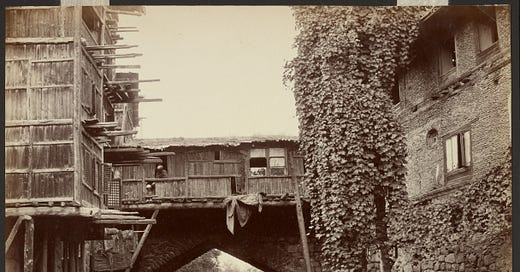my wife and oldest daughter are traveling in England. last time we chatted they were on their way to see Shakespeare’s Much Ado About Nothing, in his hometown of Stratford-upon-Avon.
I’m at home with the other three, trying to be a good father (heh).
my long-arc work of writing is temporarily paused, but I thought I’d share a couple things—one is a new song I’m working on, currently called “Padma River”, and the other is a letter. and for context (and to be coy), I’ll start with the letter.
lately, my night reading has been Rabindranath Tagore’s short stories. this collection was written on the banks of riverine Bengal, and Tagore wove the Padma and other rivers into many of his narratives. the ever-passing water, rivers swollen in rainy season, the constant flow of boats and people along the banks—these were images he would pay homage to throughout his life.
the translator added some of Tagore’s personal letters from the same period. this one, written to his niece, stood out to me for its reflections of a creative mind. writing can be beautiful work, but also lonely work. and getting a glimpse into a writer’s mind—how it blossoms through its surroundings and into stories—is a pleasure to read.
Sajadpur, 5 September 1894, to Indira Devi1
After sitting in the boat for so long it's good to arrive at the Sajadpur house. There are big windows and doors: light and air can come in unimpeded from all sides. I'm looking out at the green branches of trees and listening to the sound of bird-song.
As soon as you go out on to the southern verandah the scent of kāminī-flowers hits you, filling every pore. I suddenly realize how hungry I was for wide open space, now that I am here and can take my fill of it. I am the sole occupant of four huge rooms – I sit with all the doors open. Here my mood for writing and desire to write are like nowhere else. A living influence from the world outside opens all doors and enters freely: light and sky and air and sounds and scents and the green ripple of the trees and my rapturous mood – all combine to create many stories. At midday, especially, there is something deeply magical about this place. The warmth of the sun, the stillness, the emptiness, the calls of the birds (especially the crows), and long and delightful leisure together make me detached yet keenly sensitive. I feel, somehow, that in this golden noon sunshine an Arab tale could be made: a Persian or Arab landscape – Damascus, Samarkand, or Bokhara; bunches of grapes, rose-gardens, nightingales singing, wine from Shiraz, desert paths, lines of camels, horsemen and travellers, clear fountains shaded by date-palms; towns, with narrow streets shaded by awnings, shopkeepers in loose robes lining the roads and selling melons and pomegranates; huge palaces, with the scent of incense inside and enormous cushions and embroidered silks by the windows, curling hubble-bubble pipes snaking round [our] feet … and in that mysterious, unknown, distant land, in those opulent, marvellous, beautiful yet awesome palaces, thousands of probable and improbable stories made from human hopes and fears and laughter and tears!
My noons at Sajadpur are the best time for writing stories. I remember at exactly this time, sitting at this table, I thought up and then wrote ‘The Postmaster’. I wrote, and the light and air all around, and the murmurings of the leaves, added their own language. There are few pleasures as great as that of composing something exactly as one wishes, submerging oneself completely in the scene all around. This morning I was writing a piece about nursery-thymes – chara – I got completely absorbed in it: a great joy. chara belong to their own separate realm in which there are no rules or laws – a misty realm. Unfortunately the material world, in which rules and laws have much greater influence, is always creeping up behind me. While I was writing, there was a sudden uproar from the office, and my misty realm was blown away – and all my time up till lunch was taken up.
There is nothing more calculated to induce inertia than a heavy meal at midday: our imaginative powers and higher aspirations are completely killed by it. Because Bengalis eat so much at midday, they cannot enjoy the intense beauty of that hour: instead they shut the door and smoke, or chew pān and complacently settle down for a nap – and become extremely glossy and fat as a result. But a peaceful, secluded afternoon amidst the boundless, monotonous, flat, wheat-fields of Bengal conveys a greater and deeper stillness than is found anywhere else. Even in my childhood, the afternoon moved me especially. I would sit reading on my own, on a curved settee, with the warm breeze blowing through the open door, and no one on the roof outside. I filled those long hours with so many dreams, so many unspoken yearnings!
my current writing situation is… well, more simple. I like to believe that whatever limitations I may have in my writing go to magnify my imagination and creative energies. where one sense is lessened, the others step forward?
below, I’d like to share a new song I’ve been working on. the working title “Padma River” (see, now you have some context). it seems to be a sort of love song, and a visual invitation to listening. I’ll let you decide. it needs some work. and I recorded this sketch just for myself. be merciful.
song + lyrics below:
Keep reading with a 7-day free trial
Subscribe to Snowmelt to Roots to keep reading this post and get 7 days of free access to the full post archives.




